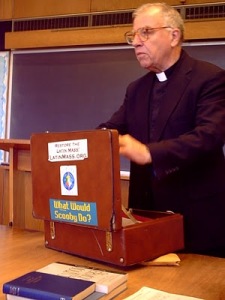Confusion on the what is meant by the third use [of the law] has lead to its rejection by certain Lutheran theologians (See the Braaten-Jenson “Christian Dogmatics”, 2:275). This is somewhat of an internal embarrassment, since the third use of the law is entitled to a separate article in the Formula of Concord, the definitive confessional document for Lutherans. For others the third use of the law has been interpreted simply to mean that the first and second uses of the law remain in force. Such a view is not the Lutheran one, even though some Lutherans have claimed this definition. The introduction of the law into the life of the Christian seems a legalistic intrusion denying the freedom of the gospel or turning the gospel into law because the gospel requires or demands certain types of behavior. In answering this ticklish question for Lutherans, I would like to make reference to Luther’s understanding of the Ten Commandments in his Small Catechism as a way out of this dilemma. The reformer’s explanations of the commandments, with the exception of the first and sixth, have two parts: negative prohibitions and positive requirements. Thus the one on killing prohibits bodily harm to our neighbor and requires providing for his physical needs. The one on stealing prohibits any attempt, even if it legal, to obtain the neighbor’s property. Rather he is required to help the neighbor improve it. Luther by not mentioning outward robbery and murder assumes that the Christian simply will not do these things. Gross immorality is out of range for the Christian, but refraining from it does not even begin to fulfill the commandments. Any harm to the neighbor breaks the commandments. You may not rob the neighbor, but if you manipulate law or contract to deprive him of his property, you stand condemned. Perhaps Luther’s delineation of the law of God to less than blatant transgressions is acceptable by all. But Luther reverses the negative prohibition into the positive requirement of helping the neighbor, especially in his distress. The prohibition against cursing God becomes a requirement to pray. Instead of saying foul things about our neighbor, even if they are true, we are to put the best construction on everything. Luther’s explanation of the first and sixth commandments have no prohibitions whatsoever. He turns the first commandment around so that the prohibition against idolatry becomes an invitation to faith. What was law is now gospel. About the sixth commandment Luther makes no mention of adultery, but says that spouses should honor and love one another.
In my estimation Luther’s positive intensification of the commandments is the work of theological genius. His explanation of the commandments are addressed to Christians, not non-Christians. They have nothing to say to civil law. Rather they are addressed to Christians as sinners and saints. Man as a sinner cannot escape the negative prohibitions of the law, but at the same time the Christian is addressed as a saint, taken back to that original paradise situation in which he loves God and his neighbor. The Christian, since he is in Christ and Christ in him, even before he becomes aware of the possibility of fulfilling the law, is actually fulfilling the law.
Has Luther manipulated the Ten Commandments beyond their recognition by following the negative prohibitions with positive suggestions? Here is the law in its pristine sense as positive requirement as it was known before the fall into sin. Here is the law as it was fulfilled in Christ. All of the positive descriptions of the law in the Christian’s life are really only Christological statements, things which Jesus did and which reached their perfection in him. The fulfilled law is Christological, as it is the account of the life and death of Jesus. He loved God with his whole heart, he prayed to God, he heard the word of God and kept it, he honored his parents, he helped those in bodily distress, he lived a life of pure thoughts, he provided for those in financial distress, he spoke well of others, he had no evil desires. Christ is the fulfillment of the law not only in the sense that all the Old Testament prophets spoke of him, but he is the positive affirmation of what God requires of us and what God is in himself. In Christ the tension of the law and the gospel is resolved.
Luther’s understanding of the commandments as positive Christological affirmations are similar to the parable of the Good Samaritan, though I could hardly demonstrate any influence this pericope was on the reformer’s mind. The commandments are not really fulfilled by refraining from the prohibited evil, but helping the stricken traveler. Thus Christians should be embarrassed into making any unwarranted claim to moral perfection for themselves. They should be so engaged in positive good that they have no time to think about their personal morality or holiness.
How did Luther come to such a radical contradiction which required that the Christian think of himself as total sinner and as a person who accomplished only the good things which Christ did? He took the first commandment with its prohibition against idolatry and turned it into an invitation to faith: “We should fear, love, and trust in God above all things.” The first commandment is transformed into a statement of the gospel. But the reformer was not playing fast and free with the commandments, as in Exodus the commandments really begin with a statement of redemption: “I am the Lord your God who brought you out of the land of Egypt, out of the land of bondage.”
– David P. Scaer, “The Law and the Gospel in Lutheran Theology”
